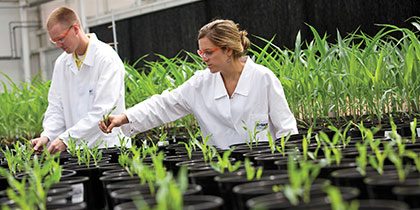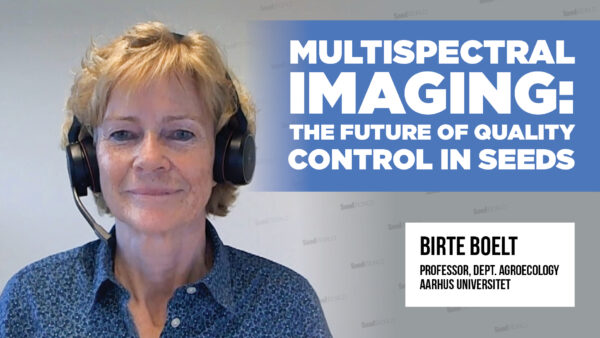BASF Crop Protection Raising the Bar
BASF’s newest division known as Functional Crop Care is set to bring the latest in new technologies to today’s ever-changing global ag community.
This past October BASF Crop Protection held a press conference in Limbergerhof, Germany, in which the company unveiled new product line-ups to be launched through to the end of 2020 with media representatives from around the globe.
Among the speakers at the conference was the president of BASF Crop Protection, Markus Heldt, who noted that the company’s newly-formed Functional Crop Care division will enable BASF to expand its reach of traditional crop protection products and become global leader in seed and biological solutions for growers by the end of this decade.
“We are looking at further significant investments at Research Triangle Park located in North Carolina,” said Heldt. “Through our wide portfolio in functional crop care solutions via seed, weed and disease control, we project increased yields of these technologies when used together.”
Functional Crop Care
The company’s new Functional Crop Care division is poised to look at new technologies that leverage the best of chemistry and biology at BASF through seed solutions, soil management and better crop care. As a result, BASF expects to generate sales of more than €500 million from its new division by 2020.
Jürgen Huff, senior vice president and head of the Functional Crop Care division, explained that enabling plants to reach their full potential by addressing stress factors throughout the growing season could significantly increase yields. “Stress factors such as weeds, diseases and pests can hold back yields by as much as 40 percent,” said Huff. “Additional stress factors such as cold, nutrient deficiency and heat can further impede yields. If we can address these factors, yields have the potential to nearly double.”
The Functional Crop Care division is looking at bringing solutions and new tools beyond crop protection products that BASF already provides explained Huff. “We look at grower needs in terms of weeds and disease and pest control. We are not distinguishing between chemistry versus biology, but [are] using both together to find further solutions for growers in these areas.”
Product research and development already underway include biofungicides and bioinsecticides for disease and pest management as well as early crop enhancement to help maintain plant health. “It’s a growing area of science that complements chemistry-based crop protection,” stated Huff.
The use of beneficial nematodes is another new area BASF is researching. “We have found that the use of beneficial nematodes, applied as a spray or soil drench, can provide curative control of a range of insects,” said Huff. He added the technology can be used alongside fungicide and insecticide chemistries, and could be considered a new tool for providing quick performance in integrated pest control programs.
“With BASF’s research capabilities and innovative product portfolio, Functional Crop Care is uniquely set up to harness the progress achieved through our interdisciplinary chemistry and biology research,” said Huff. “This will help us to unlock agricultural potential in new areas such as soil management, where we look for products to enhance water and nutrient management in the soil.”
Seed Solutions
In 2012, BASF finalized the purchase of Becker Underwood, a leading provider of biological seed treatments and seed treatment colors and polymers, as well as products in the areas of biological crop protection. This latest acquisition has many at BASF excited about the future, especially in terms of innovative seed solutions.
“Seed solutions [have] become a very high-tech product, especially in a world with a growing population,” stated Heldt. “Seed enhancement technologies are important, and this has greatly changed for us since the purchase of Becker Underwood. Modern seed treatments such as polymer technology have only enhanced our research and development capabilities, and it’s these new tools that producers can do a lot with from our expanding portfolio.”
According to Huff, the purchase of Becker Underwood has been a perfect fit in terms of synergies between the two companies. “BASF has been active in seed treatment projects, biological control and soil and nutrient projects for some time, and this addition only complements our portfolio of products,” he explained.
Heldt, said using a modern seed treatment package from BASF opens up a whole new area in terms of biological crop protection, which will only influence yields positively. He explained that biostacked technologies provide increased plant vigor, drought tolerance and better nutrient availability.
“Becker Underwood’s portfolio of biostacked products now adds different biological tools to enhance yields. In tests you can see the difference by using a biostacked product to enhance plant growth and vigour,” said Heldt. “The biostacked products can also be used in combination with conventional seed treatments. We are planning to announce new biostacked products coming to market in 2014 and expand the availability of these products throughout all regions where BASF is present.”
BASF has launched a range of Vault biological seed treatments for soybeans which are currently available to growers in the United States. Huff noted that BASF is looking to expand its popular biostacked portfolio in North America into Latin America in the near future.
Soil and Water Management
Becker Underwood is now fully integrated with BASF’s existing research, development and marketing activities in the areas of seed treatment, biological crop protection, plant health, and water and soil management. “Soil management is the start for proper seed growth. There is a great need for producers to have the ability to manage water supply and work on water management, and we need to offer new products in this area,” explained Heldt.
BASF plans to release a new water management product for corn producers by mid-decade, which Huff maintained will enable farmers to use water more efficiently to improve yields and reduce their irrigation costs. “With this new technology producers will be able to see up to 50 percent in water savings and irrigation costs,” explained Huff.
Heldt stated that BASF is also looking at new products to deliver proper nutrient supply throughout the entire growing season. “Depending on environmental conditions nutrient loss can be great … up to 50 percent in some locations. A new technology called Limus from BASF can help keep and maintain the appropriate nutrients throughout the growing season as the plants require them,” said Heldt. “This new technology also greatly reduces nitrogen loss into the atmosphere.” Limus is expected to be launched mid-decade.
Shannon Schindle
BASF Agricultural Products CenterThe BASF site in Research Triangle Park, located in Raleigh, N.C., is home to the company’s Agricultural Products Center. The APC is headquarters for the BASF Agricultural Solutions North American Crop Protection division, BASF Plant Science, BASF Global Insecticide Research and BASF Global Agricultural Research and Development. |












